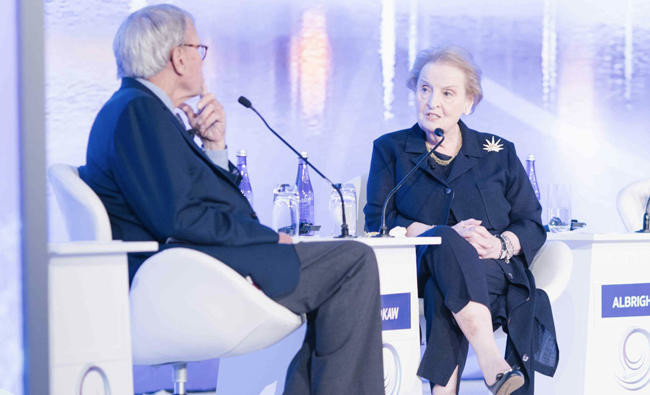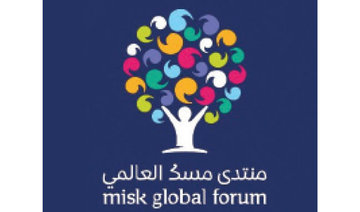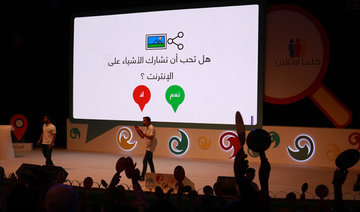NEW YORK: Economic development is a key factor in deterring young people in the Middle East and elsewhere from becoming involved in violent extremism, a gathering of world leaders heard in New York.
A one-day youth forum on tolerance — held under the joint auspices of the MiSK Foundation, the Saudi Arabian philanthropic organization headed by Saudi Crown Prince Mohammed bin Salman, and the UN Development Program — was told that economic advancement would encourage young people to participate in civil society and peaceful dialogue.
Abdullah Al-Mouallimi, Saudi ambassador to the UN, told the forum that the Kingdom’s Vision 2030 strategy aligned with the UN’s 2030 Agenda for Sustainable Development.
“Both have not only economic parameters, but are also about the potential in society, the environment and in justice. The Saudi strategy describes a vision of how to move from dependence on one commodity and how to develop a more coherent society with integrity in its approach to social issues, which are also the goals of the UN,” Al-Mouallimi said.
He highlighted the role of young women in the transformation. “Saudi women comprise 60 percent of the college population in Saudi Arabia, and they are going to come to the workforce and make a dramatic difference,” Al-Mouallimi said.
Bader Al-Asaker, secretary-general of the MiSK Foundation, said: “Our aim is to shine a light on the transformative power of youth, to lift them up and prove a platform for young people to create positive change.”
Michael Bloomberg, the media entrepreneur and former mayor of New York, said that he was in partnership with MiSK in Saudi Arabia to train young citizens in economics and finance. He said that the growing number of young people who live in cities, both in the Middle East and the rest of the world, would help promote tolerance and peace.
“Some people call them the millennial generation, but I’d rather refer to them as the metropolitan generation. Now 50 percent of the world’s population live in cities, and nothing has done more than cities to spread tolerance and peace in the world. Cities also encourage innovation and sustainable development,” he added.
Achim Steiner, administrator of the UN Development Program, also stressed the role of economic development in nurturing tolerance. “For young people, achieving the Sustainable Development Goals means the possibility of attending school, having access to health care, participating in their civic and political discourse, and living free from conflict. It means having hope and prosperity.”
The one-day MiSK event in New York consisted of high-level panel discussions, speeches and workshops, with more than 20 youth leaders from round the world.
A senior adviser to MiSK said the event was part of the Kingdom’s global outreach program, and that there would be further cooperation between Saudi Arabia and the UN on specific development initiatives.
“The younger generation is driven by the desire to create an impact, and if you don’t give them opportunities in entrepreneurship they’ll find another way to do that,” the adviser said.
The MiSK-UN event, which was attended by more than 400 people from 60 countries, coincided with the 72nd Session of the UN General Assembly (UNGA).
A panel moderated by former NBC News anchor Tom Brokaw and featuring former US Secretary of State Madeleine Albright focused on the information revolution and what she called the “disaggregation” of news. Albright advised the young audience to be skeptical about the information they encounter, especially on social media.
Two other panels discussed the challenges faced by refugees around the world and how best to counter violent extremists. Panelists on the latter panel stressed the importance of engaging with youth and offering them a sense of hope and purpose.
One memorable moment came when Saudi writer Kawthar Al-Arbash recounted the moment she learned that her son had been killed after he stopped a suicide bomber from carrying out an attack inside a mosque in the city of Dammam. Her moving, personal account was met with a standing ovation.
Economic growth key to fight against extremism, Saudi MiSK forum in New York hears
Economic growth key to fight against extremism, Saudi MiSK forum in New York hears

Saudi Arabia extends condolences to Sudan after 11 die in mine collapse

- The collapse of the gold mine in the remote desert area of Howeid, northeast Sudan killed 11 miners and wounded seven others
RIYADH: Saudi Arabia extended its condolences and sympathy on Sunday after a traditional gold mine in Sudan partially collapsed and killed 11 miners.
The collapse of the gold mine in the remote desert area of Howeid, northeast Sudan also wounded seven others, the country’s mining company said on Sunday.
The Foreign Ministry said the Kingdom stands with Sudan during this tragedy and wishes the injured a speedy recovery.
Jeddah panel explores declining marriage rates among youth

- Discussion highlights changing views on commitment, societal pressures, search for meaningful connection
JEDDAH: Amid changing values, shifting priorities and growing alternatives to traditional partnerships, a panel titled “Why is there a decline in marriage today?” has explored evolving views on love, commitment and marriage.
Organized by Ta3mq, a platform focused on honest dialogue, the event at Hayy Jameel’s Rukn Space in Jeddah featured panelists from psychology, community leadership and youth engagement.
It was moderated by Tasneem Alshanqiti, Ta3mq founder, and Motaz Al-Safh, a Saudi engineer and entrepreneur. The session addressed generational concerns, fears and new definitions of partnership.

Reflecting on her role, Alshanqiti said: “I wasn’t just moderating — I was carrying the voice of younger women,” adding that she aimed to create a safe space that encouraged openness and reflection.
Panelist Rozana Albanawi, founder of Qeema and Jeddah_CM, said that the discussion explored marriage from societal, religious and psychological perspectives, focusing on self-understanding, compatibility over idealism, and the evolution of love.
Al-Safh said that he focused on creating a safe, judgment-free space for men to express vulnerability.
He described the conversation as “more like a talk between brothers than a formal panel,” aiming to help participants understand their fears and feelings about love and commitment.
The discussion highlighted recurring themes among Saudi youth. Al-Safh said that a few key issues kept emerging: Fear of failure, feeling unready, and pressure from expectations. Many question whether marriage today feels like love or a liability.
He added: “But beneath it all, there’s a real craving for connection, just done right, in a way that feels safe and meaningful.”
Dr. Khalid Sindi, a relationship and marriage psychotherapist, offered a broader national perspective by linking personal challenges to policy and social change.
Speaking to Arab News, he noted the ongoing transition in Saudi marriage values — from traditional to more modern — while emphasizing the preservation of core Islamic principles.
He highlighted government efforts under Vision 2030, such as the Saudi Marriage Fund and Sakani housing program, aimed at easing economic barriers for youth.
Sindi added: “Younger generations are seeking marriages that blend our cherished traditions with contemporary expectations of emotional connection and mutual growth. This represents not a rejection of our values but their natural adaptation to modern life.”
The panelists said that changing views on love and commitment reflected maturity rather than uncertainty.
Albanawi said: “There is high awareness among the generation now on marital topics, and many are seeking marriage with the right tools.”
She explained that conversation and dialogue help young people to commit while accepting uncertainty in relationships.
“The younger generation is looking for new ways to shape their marriage, such as avoiding unnecessary rules like high financial burdens or societal expectations that don’t match their reality.”
On the event’s outcome, Albanawi added: “A common theme was that marriages work best when couples marry early, are ready, and have family support.”
She noted that many believe delaying marriage increases fears and makes adaptation harder.
Sindi expressed a similar view on marriage’s evolving nature, saying that the changing views reflected progress and natural generational dynamics rather than fear or uncertainty.
“Rather than seeing shifting perspectives as problematic, the older generation should guide younger Saudis with wisdom and empathy.”
Highlighting the national context, Sindi noted the vital role of government initiatives in supporting Saudi Arabia’s vision for marriage and family life, demonstrating a commitment to making families society’s cornerstone.
Reflecting on the session’s emotional honesty, Al-Safh said that hearing men express concerns such as, “I don’t want to fail someone’s daughter,” revealed deep care often left unspoken.
Alshanqiti echoed the need for open, non-judgmental spaces, saying fears about failure and not being enough reminded her that many seek places where they can be truly seen and heard. She described the session as a step toward that openness.
Global sculptures at open-air museum in historic Jeddah

- The sculptures form a dynamic dialogue between the past and present, blending the site’s heritage with the language of contemporary art
JEDDAH: As part of a broader effort to revive the region’s visual identity through art, Al-Arbaeen Lake in historic Jeddah has been transformed into an open-air gallery featuring a curated collection of sculptures by international artists.
Led by the Ministry of Culture in cooperation with Jeddah Municipality, the initiative features 14 world-class artworks integrated into the city’s visual landscape, Saudi Press Agency reported.

The sculptures form a dynamic dialogue between the past and present, blending the site’s heritage with the language of contemporary art.
Notable works on display include “The Illusion of the Second Cube” by Hungarian-French artist Victor Vasarely; “Rouge” and “Flexibility of Balance” by Alexander Calder; “Circular Mass” by Arnaldo Pomodoro; “The Bird” by Spanish sculptor Joan Miro; and “Giving and Receiving Love” by Lorenzo Quinn — a powerful piece that reflects human values through striking aluminium forms.
FASTFACTS
• Led by the Ministry of Culture in cooperation with Jeddah Municipality, the urban art initiative features 14 world-class artworks integrated into the city’s visual landscape.
• Notable works on display include ‘The Illusion of the Second Cube’ by Hungarian-French artist Victor Vasarely and ‘Giving and Receiving Love’ by Lorenzo Quinn.
The installations are part of a wider artistic movement that reimagines public spaces as platforms for cultural engagement.
By transforming urban environments into art experiences, the project invites both residents and visitors to explore the intersection of architectural heritage and modern creativity.
It underscores the growing role of art in shaping urban identity and fostering public appreciation for visual beauty in shared spaces of the Kingdom.
Saudi FM receives Djiboutian counterpart

- The two sides discussed bilateral relations and ways to enhance cooperation in various fields
RIYADH: Saudi Foreign Minister Prince Faisal bin Farhan received his Djiboutian counterpart, Abdul Kader Hussein Omar, in Riyadh on Sunday.
During the meeting, the two sides discussed bilateral relations and ways to enhance cooperation in various fields, the Foreign Ministry wrote in a post on X.
The two ministers also chaired a meeting of the Political Consultations Committee between the two countries, during which they discussed coordination on key regional and international issues.
Saud Al-Sati, deputy minister for political affairs, was among the officials in attendance.
Saudi FM receives written message from Russian counterpart

- Al-Khuraiji and Kozlov elaborated on relations between their countries and ways to enhance them in various fields
RIYADH: Saudi Foreign Minister Prince Faisal bin Farhan received a written message from his Russian counterpart Sergey Lavrov, Saudi Press Agency reported on Sunday.
The message, regarding Saudi-Russian relations and ways to support and strengthen them in various fields, was received by Deputy Foreign Minister Waleed Al-Khuraiji in Riyadh during a meeting with Russia’s ambassador to the Kingdom Sergey Kozlov.
During the meeting, Al-Khuraiji and Kozlov elaborated on relations between their countries and ways to enhance them in various fields. Topics of common interest were also discussed, SPA added.





















